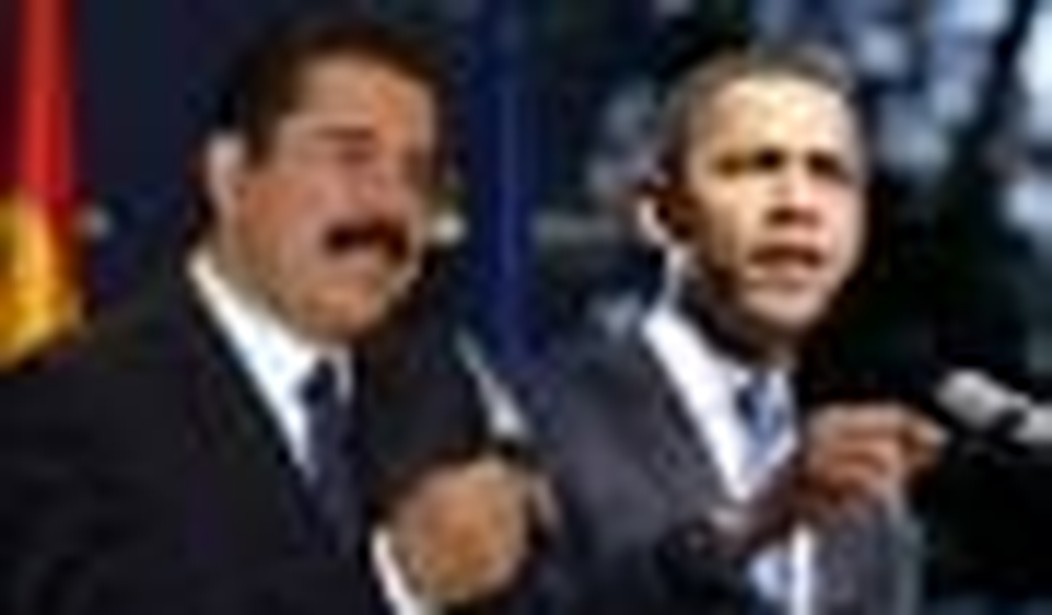On September 16, Greta Van Susteren interviewed Honduran President Robert Micheletti about the Obama administration’s attempt to force the return of former President Manuel Zelaya to office (supposedly just to serve the few remaining months in his term):
Van Susteren: Have you ever met President Obama or Secretary Clinton?
Micheletti: No, no, no. I admire them, but never in my life. One day I had a telephone call from Mrs. Clinton.
Van Susteren: What did she have to say?
Micheletti: She asked me to find a way to return Mr. Zelaya.
Van Susteren: What did you say?
Micheletti: No.
Things are obviously at an impasse with Honduras, with the point of no return — elections in which the Honduran people will elect a new president — looming in November. There is an obvious solution to the Honduran crisis, one the Obama administration is now employing with respect to Iran: talks!
The real question, however, is how to get them started, since both sides are so committed to their respective positions. A review of the Obama administration’s use of smart power with respect to Iran offers six lessons that can be duplicated in Honduras.
1. Start calling Honduras by its full name. According to Wikipedia, it’s “República de Honduras, pronounced ‘republika de on-duras.’” We should acknowledge that Honduras, as its name indicates, is a republic, with a constitution and a supreme court to enforce it — it’s not as if it were some theocratic dictatorship with a president put in office as a result of a rigged election.
2. Send a video to the Republic of Honduras. In the video, the president should extend to the people of Honduras our warm wishes and congratulations on their 188 years of independence. Sure, there’s sadness and worry about the unfortunate attempt by their former president to violate Section 239 of their constitution, but perhaps that is an issue for the Honduran supreme court and Honduran congress, rather than us. It certainly should not stand in the way of talks.
3. Offer direct talks with the United States. It’s always good to have a group do the talking (such as the P5 with Iran, or the six parties with North Korea, or the OAS with Honduras), but such discussions tend to go nowhere. We should talk directly, even with our worst adversaries, and certainly with our longtime friend. It is silly to try to punish Honduras by not talking to it. As Abraham Lincoln or some similar president once said, the “notion that somehow not talking to countries is punishment to them … is ridiculous.”
4. Place no preconditions on the talks. Preconditions just stop talks right in their tracks. Take the Israeli-Palestinian negotiations (please). Israel told President Obama in May it wanted to commence negotiations with the Palestinians — with no preconditions. But the Palestinians insisted on a precondition — one not set forth in the Oslo Process (which resulted in an offer of a Palestinian state on 97% of the West Bank) or in the Annapolis Process (which resulted in an offer of a Palestinian state on 100% of the West Bank, after land swaps). Apparently, the Palestinians were concerned that, without the precondition, they might not receive a third offer of a state, or something. Their confidence perpetually needs rebuilding.
In any event, the U.S. has spent four fruitless months negotiating with Israel on behalf of the Palestinians — reneging on longstanding oral understandings with Israel, ignoring written assurances from a prior president — and the Palestinians have just been standing by, watching as the Obama administration works for them. The Obama Process is already four months behind schedule!
Let’s not make the same mistake with the Republic of Honduras. Do what we’re doing with Iran: no preconditions!
5. Do not set a time limit. Once the talks start, the last thing we would want to do is set a time limit for them, because that will mean we may very well have to end the talks before they succeed. A time limit is an obstacle to peace, since it limits time.
If we find we must impose a time limit, we need to make sure it is one the other side can meet by sending us a memo that ignores our request, offers evasive blather, but can be treated by one of our prominent useful idiots as something that “bears close scrutiny.”
6. Do not worry if what we want to talk to Honduras about is not on the agenda. Perhaps Honduras will want to talk about applying their safeguards for democracy to all the other countries around the world. Perhaps Honduras will want to discuss how their single-term constitutional provision has worked for them and suggest that the real problem is that the U.S. allows two terms. Perhaps they will say that they have already spoken directly to our secretary of state and told her “no” (and given the same answer on multiple other occasions) and request that we start the talks by informing them what part of their prior answer we do not understand.
None of this should matter: there is simply no way to know for sure what their position is unless we first call them by their proper name, send them a video, offer direct talks, put no preconditions on them, do not set a time limit (and don’t enforce it if we do), and do not worry that they won’t put our concerns on the agenda. This is what we have done with Iran and — unlike Honduras — talks will start on October 1. The smell of a Nobel Peace Prize is already in the air.









Join the conversation as a VIP Member